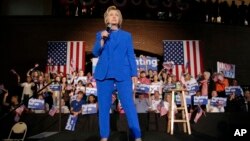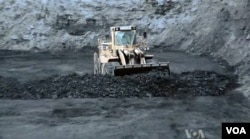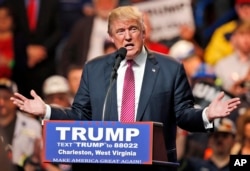Democratic presidential candidate Hillary Clinton has a $30 billion plan to diversify the economies of U.S. coal towns. Voters in the state of West Virginia, second in the nation in coal production, do not care.
The former secretary of state lost her party's primary there Tuesday while businessman Donald Trump cruised to victory on the Republican ballot. Trump, who promised to bring coal jobs back, got nearly twice as many overall votes as Clinton did in her race against Vermont Senator Bernie Sanders.
Patrick Hickey, an assistant professor of political science at West Virginia University, told VOA the result will be similar in November when he expects Trump to find his highest level of support there out of any of the 50 states.
Exit polls from Tuesday's primaries showed the top concern for West Virginia voters is the economy.
"We’ve lost a lot of coal jobs recently and jobs in general, so I think people are kind of fed up with the entire system and think the system is rigged against them, and I think that’s really the root of the appeal for both Trump and Sanders," Hickey said.
Democrats have done steadily worse in West Virginia since 1996 when Clinton's husband, Bill, easily won it against Republican Bob Dole. In that election, Dole got 37 percent of the vote. By 2012, the situation had flipped with President Barack Obama getting 36 percent in his blowout loss in West Virginia to Mitt Romney.
But in other states in the region, including fellow coal producers Pennsylvania and Ohio, Obama won the past two elections and Hillary Clinton won primaries in those two states this year.
Hickey said those surrounding states already have more economic diversity and people there recognize in programs such as the bailout of the auto industry under Obama a positive role the federal government has played in their lives.
"We’re waiting for something to happen to transform what was an economy dependent on coal production to an economy powered by something else," Hickey said of West Virginia. "And the question here is really, what is that something else?"
He said the problem with Clinton's multi-point plan is that West Virginians have been hearing that kind of pledge for 30 years with no result while the other states have seen action.
As much as the messages of Trump and Sanders connected with voters in West Virginia during the primaries, its small size makes it less important come November. The general election winner is decided under the Electoral College system, which requires a candidate to earn 270 out of 538 votes to win. Whoever wins West Virginia earns only five electoral votes.
The Democratic and Republican candidates, likely Clinton and Trump, will spend much of the next six months trying to appeal to the 42 percent of Americans who, according to a January Gallup poll, identify as independents. Some states allow those voters to take part in the primary process, but for the most part the races so far have only involved people registered as Democrats or Republicans.
"One thing I think is key to distinguish when we look forward to Trump-Clinton potentially in November is that the Republican Party electorate is very different than the general election electorate," Hickey said. "And so I think what are Trump’s strengths in winning the nomination will be his weaknesses in the fall in the general election."
As unpredictable as Trump's rise to the Republican nomination has been, Hickey said he does not expect the national vote to be much different than historical races because of voter demographics.
"In the general election we can tell by the percentage of African Americans in a state, or the percentage of Hispanic voters in a state or the percentage or urban versus rural. Those are pretty predictable voting patterns in terms of Democratic or Republican presidential candidates," he said. "I don’t see that Trump will really change that map. If anything I think there will be some kind of anti-turnout. Like Hispanics might not like Hillary Clinton, but if someone says they’re going to build a wall and deport all undocumented workers then they might turn out to vote against that person. So I think those demographic fundamentals will not change in 2016."














